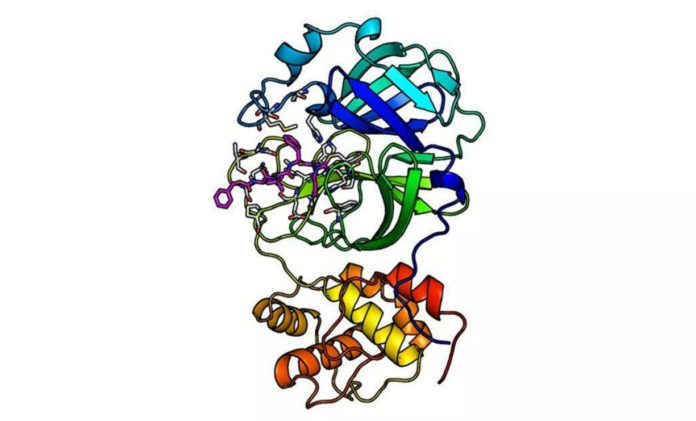Scientists have identified two families of active substances that block the replication of the SARS-CoV-2 coronavirus. Candidate drugs are capable of disabling a key viral enzyme, the main protease.
After the virus penetrates the host cell, its reproduction begins – replication, the key enzyme of which is the main protease. First, the virus genome is transmitted from RNA into a large protein chain, and then the main protease cuts this chain into smaller parts from which new viral particles are formed.
- Scientists in Fear of This New Predator From Red Sea Eating Native Species in Mediterranean
- Does This Mean We Stopped Being Animal and Started Being Human Due to ‘Copy Paste’ Errors?
- The One Lifestyle Choice That Could Reduce Your Heart Disease Risk By More Than 22%
- Aging: This Is What Happens Inside Your Body Right After Exercise
- Immune-Boosting Drink that Mimics Fasting to Reduce Fat – Scientists ‘Were Surprised’ By New Findings
If this enzyme is blocked, replication of the virus stops. Therefore, pharmacists developing new drugs for COVID-19 often see the main protease as a primary target.
Pharmaceutical chemists from the University of Bonn, based on the structure and mechanism of operation of this important viral enzyme, have identified a large number of potential inhibitors of the main protease of the SARS-CoV-2 virus. The work was carried out within the framework of the interdisciplinary program “Life and Health”.
“A suitable inhibitor must bind tightly enough to the main protease to be able to block its active site,” one of the study’s authors, Michael Gütschow, who heads an independent research group at the Pharmaceutical Institute, said in a university press release.
To assess the effectiveness of each of the potential inhibitors, the authors have developed a new fluorescent test system. They created a substrate that included a special reporter molecule. When an active main protease cleaves this molecule, a fluorescent light is produced, the intensity of which can be measured. If the simultaneously administered inhibitor successfully blocks the protease activity, then there is no luminescence.
“For most of the tested compounds, we did not observe enzyme inhibition. But in rare cases, in our complex tests, fluorescence was suppressed. We hope for these results when looking for substances that block coronavirus,” says Gütschow.
The authors performed high-throughput screening of potential inhibitor molecules, which revealed two promising classes of compounds that block the catalytic site of the main protease and prevent it from preparing the basis for viral replication. They synthesized these substances and tested their effectiveness in the laboratory.
“The best compounds are potential structures for drug development,” said study author Prof Christa Müller of the University of Pharmacy, Bonn.
- Scientists in Fear of This New Predator From Red Sea Eating Native Species in Mediterranean
- Does This Mean We Stopped Being Animal and Started Being Human Due to ‘Copy Paste’ Errors?
- The One Lifestyle Choice That Could Reduce Your Heart Disease Risk By More Than 22%
- Aging: This Is What Happens Inside Your Body Right After Exercise
- Immune-Boosting Drink that Mimics Fasting to Reduce Fat – Scientists ‘Were Surprised’ By New Findings
“Some compounds have an added effect – they suppress the human enzyme that helps the virus penetrate the cells of the body”.
The authors emphasize that their research is based on laboratory experiments and further use of the substances they discovered in therapy will require extensive clinical trials.
The results of the study are published in the journal Angewandte Chemie.
